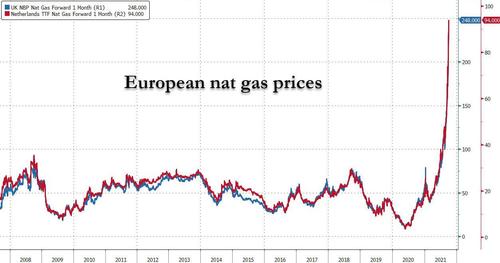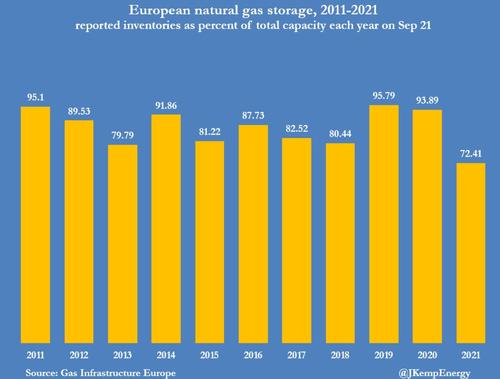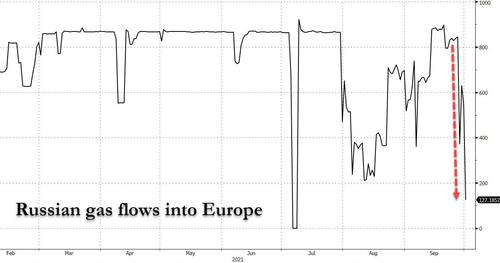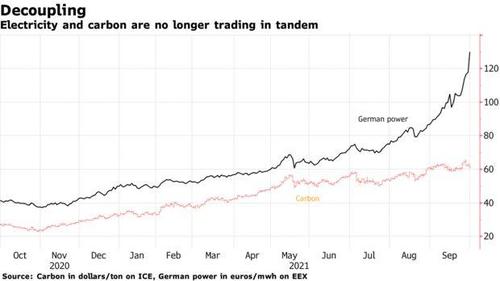European Gas Hits A Record 100 Euros As Russian Gas Flows Collapse By 77%
While Russia would never admit it, Putin is slowly but surely tightening the screws on Europe’s hyperinflating energy prices just as China told the world it will buy every source of energy that is not nailed down.
On Friday, front-month European nat gas (Dutch TTF) briefly soared to a record 100 euros before retreating, at the as China stepped up a global fight for energy supplies, ordering top energy companies to secure energy supplies “at all costs” in a move that threatens to push prices to unprecedented levels, and comes just as flows into Germany via a key Russian pipeline tumbled.
Dutch gas futures surged to 100 euros a megawatt-hour, before retreating 0.7% to 97 euros. Prices were swinging between gains and losses as traders weighed the potential for demand curbs as more factories shut or reduce production.
Europe has been scrambling to secure enough gas and coal ahead of the winter, with rising prices forcing some of industrial giants from fertilizer producers CF Industries to Yara International ASA and chemicals giant BASF SE to shut plants or curtail output.
As Bloomberg energy commentator Javier Blas puts it, “European gas prices are (and had been for several weeks already) in full demand-destruction mode. The market is trying to force industrial consumption off to preserve gas for the rest of the (largely price inelastic) economy.” Translation: millions of people will end up without heating during the winter.
GAS MARKET: European gas prices are (and had been for several weeks already) in full demand-destruction mode. The market is trying to force industrial consumption off to preserve gas for the rest of the (largely price inelastic) economy | #EuropeanEnergyCrunch
— Javier Blas (@JavierBlas) October 1, 2021
Unfortunately for Europe, no matter how high the price of gas, it’s not as if someone can magically flip the switch and unleash supply. As it stands, European storage sites are just under 75% full, the lowest level for this time of year in more than a decade and are about to get even lower: inventory withdrawals typically start by the end of the month, depending on the weather. So far, temperatures in northwest Europe are forecast to be largely within seasonal norms in October.
Meanwhile, reminding Europe once again who is in charge at least of winter heating, flows from Europe’s top supplier Russia into Germany’s Mallnow via the key Yamal-Europe pipeline plunged by 77% from Thursday, just as the heating season begins. At an auction on Thursday, no extra pipeline capacity was booked to deliver fuel to the Mallnow compressor station the following day.
Physical flows via the Yamal-Europe pipeline, which traverses Poland, have dropped to 5,313 megawatt hour per hour on Friday morning from 22,705 megawatt hour per hour on Thursday evening via the Mallnow entry point, according to the data. Supplies via the pipeline have oscillated over the past few weeks, but were largely on a declining track. Exports via the pipeline plunged in August after a fire at Gazprom facilities.
Flows dropped as Gazprom has booked only about a third of the gas transit capacity it was offered for October via the Yamal-Europe pipeline and no extra transit capacity via Ukraine.
Gazprom declined to comment. It has repeatedly said it was supplying customers with gas in full compliance with existing contracts and said additional supplies could be provided once the newly built Nord Stream 2 gas pipeline was launched.
“Gas can go now as high as it needs to knock demand out,” said Andreas Gandolfo, leader of the European power team at BloombergNEF. “For some European industries gas has become too expensive. For some, including us, who have gas heating at home, it can probably go a lot higher before there is a decision to switch off.”
According to Bloomberg, the treat of more industrial closures in Europe also risks stalling the rally in European carbon futures. Some of the companies curtailing production or closing factories are energy-intensive users and need to use carbon permits to cover their emissions. The slowdown could lead them to sell their allowances, said Trevor Sikorski, head of natural gas and energy transition at the London-based consultants Energy Aspects.
To avoid popular unrest, governments are struggling to respond to the crunch, with an increasing number taking steps to try to shield voters from the worst effects of rising prices. France will block any new increase in regulated gas tariffs and cut taxes on electricity, Prime Minister Jean Castex said on TF1 on Thursday.
“The volatile trading already shows that no one really knows how high gas can go, but we’re definitely in for a wild ride,” said Niek van Kouteren, a senior trader at PZEM, a Dutch energy company. “The question will be: where there will be demand destruction? If you then see governments stepping in and subsidizing gas prices, like France announced yesterday, there is no incentive at all to lower your demand.”
Meanwhile, Europe’s energy crisis has fully hit Asia, where the price of liquefied natural gas surged to a record $34.47 per mmBtus on Thursday. Both the cost in Asia and in Europe are about $190 a barrel of crude oil equivalent.
Tyler Durden
Fri, 10/01/2021 – 09:45
via ZeroHedge News https://ift.tt/3or2I4u Tyler Durden



